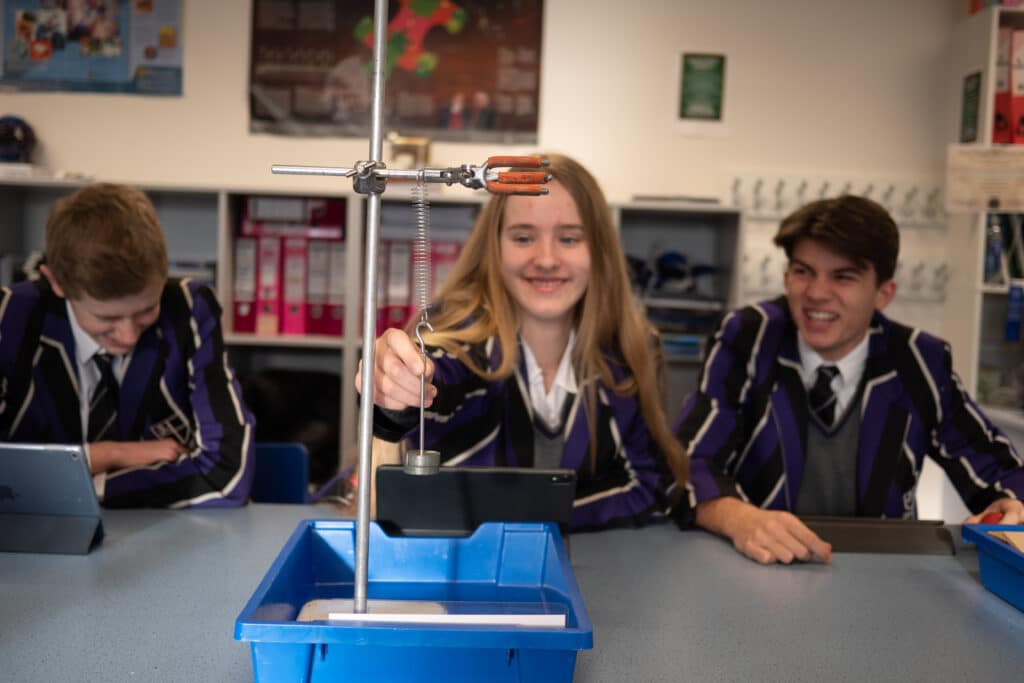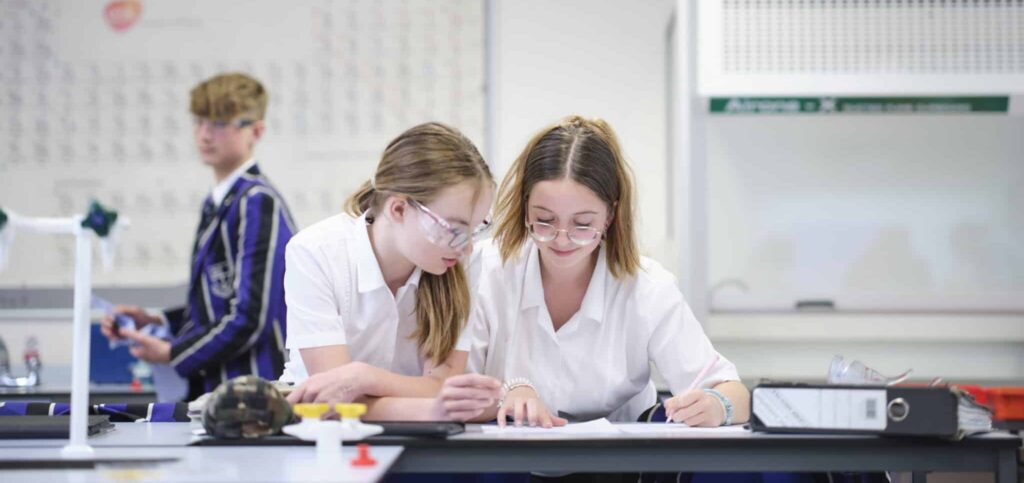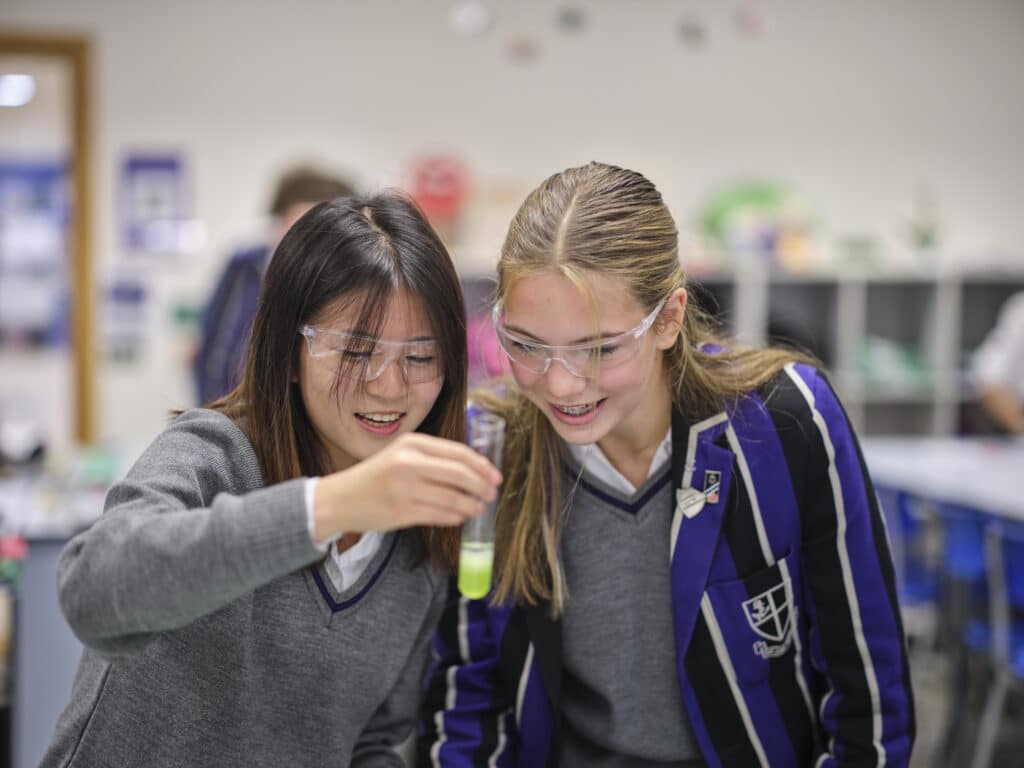
GCSE Chemistry
In this section
- Admission calculator test
- AgentHub
- Art at Kimbolton School
- Biology at Kimbolton School
- Boarding handbook
- Business at Kimbolton School
- Chemistry at Kimbolton School
- Cultural Exchange with Christianeum School, Hamburg, Germany
- Design technology and engineering
- Digital learning and computer science
- Drama at Kimbolton School
- English as an Additional Language (EAL)
- English at Kimbolton School
- Geography at Kimbolton School
- History at Kimbolton School
- Induction pack Pre-School
- Kimbolton Army CCF
- Kimbolton Pre-School (3 – 4)
- Kimbolton Royal Navy CCF
- Languages at Kimbolton School
- Mathematics at Kimbolton School
- Music at Kimbolton School
- Parents’ handbook
- Philosophy, Religion & Ethics (PRE)
- Physical Education
- Physics at Kimbolton School
- Pre-School (3 – 4)
- Prep School parents’ handbook
- Website terms and conditions
- About us
- Celebrating 425 years of educational excellence
- Cookie settings
- Engage forms
- History and English – Autumn 2024
- Induction pack Lower Prep
- Induction pack Senior School – Boarding pupils
- Induction pack Senior School – Day pupils
- Induction pack Upper Prep
- Kimbolton RAF CCF
- LAMDA
- Media gallery
- Site map
- Welcome to Ingrams
- Admissions
- Prep School (3-11)
- Admissions deposit
- Senior School (11-16)
- Welcome to Senior School
- Academic – Senior
- GCSEs
- GCSE Art
- GCSE Biology
- GCSE Computer Science
- GCSE Chemistry
- GCSE Design Technology
- GCSE Drama
- GCSE English (Lang/Lit)
- GCSE Food and Nutrition
- GCSE French
- GCSE Geography
- GCSE History
- GCSE Maths/Further Maths
- GCSE Music
- GCSE Philosophy, Religion & Ethics
- GCSE Physical Education
- GCSE Physics
- GCSE Spanish
- EAL – Senior School
- Academic support – Senior
- Our digital school
- PSHE in Senior School
- Vanbrugh Library
- Queen Katharine Building (QKB)
- Essay writing competition
- GCSEs
- Beyond the classroom in Senior School
- Well-being and pastoral in Senior School
- Careers
- Extended school day
- Sixth Form (16-18)
- Welcome to Sixth Form
- Academic – Sixth Form
- A Levels
- A Level Art (Critical & Contextual studies)
- A Level Art, Design and Photography
- A Level Biology
- A Level Business
- A Level Computer Science
- A Level Chemistry
- A Level Design Technology (Engineering)
- A Level Drama and Theatre
- A Level Economics
- A Level English Language
- A Level English Literature
- A Level French
- A Level Further Mathematics
- A Level Geography
- A Level History
- A Level Mathematics
- A Level Music
- A Level Philosophy, Religion & Ethics
- A Level Physical Education
- A Level Physics
- A Level Politics
- A Level Psychology
- A Level Spanish
- EAL – Sixth Form
- Super Curriculum
- Digital Sixth Form
- Extended Project Qualification
- Academic support in Sixth Form
- A Levels
- Beyond the classroom in Sixth Form
- Well-being and pastoral in Sixth Form
- Careers Sixth Form
- Boarding
- News
- Current families
- Academic staff list
- Co-curricular programme
- Office contacts and absence reporting
- Calendar
- Dining and menus
- Exams (GCSE / A Level)
- Careers resources
- Kim Club
- Duke of Edinburgh’s Award information
- Kimbolton School Parents’ Association
- Health Centre
- Online safety
- School shop
- Sports fixtures
- Summer sports week
- Uniform – current families
- School day
- Residential trips (Senior/Sixth)
- Senior School newsletter
- Senior School newsletter – 12 September 2025
- Senior School newsletter – 26 September 2025
- Senior School newsletter – 10 October 2025
- Senior School newsletter – 7 November 2025
- Senior School newsletter – 21 November 2025
- Senior School newsletter – 5 December 2025
- Senior School newsletter – 16 January 2026
- Senior School newsletter – 30 January 2026
- PSHE curriculum (senior)
- Wellbeing Hub
- Staff & pupils
- Alumni
- Sports & venue hire
- Support us
- Hidden
- Admission calculator test
- AgentHub
- Art at Kimbolton School
- Biology at Kimbolton School
- Boarding handbook
- Business at Kimbolton School
- Chemistry at Kimbolton School
- Cultural Exchange with Christianeum School, Hamburg, Germany
- Design technology and engineering
- Digital learning and computer science
- Drama at Kimbolton School
- English as an Additional Language (EAL)
- English at Kimbolton School
- Geography at Kimbolton School
- History at Kimbolton School
- Induction pack Pre-School
- Kimbolton Army CCF
- Kimbolton Pre-School (3 – 4)
- Kimbolton Royal Navy CCF
- Languages at Kimbolton School
- Mathematics at Kimbolton School
- Music at Kimbolton School
- Parents’ handbook
- Philosophy, Religion & Ethics (PRE)
- Physical Education
- Physics at Kimbolton School
- Pre-School (3 – 4)
- Prep School parents’ handbook
- Website terms and conditions
- About us
- Celebrating 425 years of educational excellence
- Cookie settings
- Engage forms
- History and English – Autumn 2024
- Induction pack Lower Prep
- Induction pack Senior School – Boarding pupils
- Induction pack Senior School – Day pupils
- Induction pack Upper Prep
- Kimbolton RAF CCF
- LAMDA
- Media gallery
- Site map
- Welcome to Ingrams
- Admissions
- Prep School (3-11)
- Admissions deposit
- Senior School (11-16)
- Welcome to Senior School
- Academic – Senior
- GCSEs
- GCSE Art
- GCSE Biology
- GCSE Computer Science
- GCSE Chemistry
- GCSE Design Technology
- GCSE Drama
- GCSE English (Lang/Lit)
- GCSE Food and Nutrition
- GCSE French
- GCSE Geography
- GCSE History
- GCSE Maths/Further Maths
- GCSE Music
- GCSE Philosophy, Religion & Ethics
- GCSE Physical Education
- GCSE Physics
- GCSE Spanish
- EAL – Senior School
- Academic support – Senior
- Our digital school
- PSHE in Senior School
- Vanbrugh Library
- Queen Katharine Building (QKB)
- Essay writing competition
- GCSEs
- Beyond the classroom in Senior School
- Well-being and pastoral in Senior School
- Careers
- Extended school day
- Sixth Form (16-18)
- Welcome to Sixth Form
- Academic – Sixth Form
- A Levels
- A Level Art (Critical & Contextual studies)
- A Level Art, Design and Photography
- A Level Biology
- A Level Business
- A Level Computer Science
- A Level Chemistry
- A Level Design Technology (Engineering)
- A Level Drama and Theatre
- A Level Economics
- A Level English Language
- A Level English Literature
- A Level French
- A Level Further Mathematics
- A Level Geography
- A Level History
- A Level Mathematics
- A Level Music
- A Level Philosophy, Religion & Ethics
- A Level Physical Education
- A Level Physics
- A Level Politics
- A Level Psychology
- A Level Spanish
- EAL – Sixth Form
- Super Curriculum
- Digital Sixth Form
- Extended Project Qualification
- Academic support in Sixth Form
- A Levels
- Beyond the classroom in Sixth Form
- Well-being and pastoral in Sixth Form
- Careers Sixth Form
- Boarding
- News
- Current families
- Academic staff list
- Co-curricular programme
- Office contacts and absence reporting
- Calendar
- Dining and menus
- Exams (GCSE / A Level)
- Careers resources
- Kim Club
- Duke of Edinburgh’s Award information
- Kimbolton School Parents’ Association
- Health Centre
- Online safety
- School shop
- Sports fixtures
- Summer sports week
- Uniform – current families
- School day
- Residential trips (Senior/Sixth)
- Senior School newsletter
- Senior School newsletter – 12 September 2025
- Senior School newsletter – 26 September 2025
- Senior School newsletter – 10 October 2025
- Senior School newsletter – 7 November 2025
- Senior School newsletter – 21 November 2025
- Senior School newsletter – 5 December 2025
- Senior School newsletter – 16 January 2026
- Senior School newsletter – 30 January 2026
- PSHE curriculum (senior)
- Wellbeing Hub
- Staff & pupils
- Alumni
- Sports & venue hire
- Support us
- Hidden
GCSE Chemistry at Kimbolton
GCSE Chemistry at Kimbolton School offers a comprehensive study of the principles that shape the physical world. Whether taken as part of the separate sciences or the combined science trilogy, this course builds a strong foundation in theoretical and practical chemistry, preparing you for further studies in science and related fields.
We are fortunate to have our purpose-built STEM teaching and learning facility – the Queen Katherine Building, where pupils will study for their GCSE Chemistry – that includes all the latest equipment.
Chemistry is essential because…
Chemistry helps us understand the building blocks of matter and their interactions, laying the groundwork for advancements in medicine, energy, technology, and environmental sustainability. It teaches problem-solving, critical thinking, and analytical skills that are applicable to a wide range of careers.
About the course
Our AQA GCSE Chemistry course is available as a standalone subject (Separate Sciences) or as part of the Combined Science: Trilogy award. Topics covered include:
- The periodic table and chemical bonding
- Quantitative chemistry and chemical calculations
- Organic chemistry and properties of hydrocarbons
- Rates of reaction and energy changes
- Chemical analysis and the role of chemistry in the environment.
Practical experiments are integral to both pathways, developing your ability to conduct investigations, interpret data, and apply theoretical concepts.
Assessment
In Chemistry, you will investigate the building blocks of matter through six central themes: atomic structure and bonding, chemical reactions and rates, quantitative chemistry, organic chemistry, chemical analysis, and environmental chemistry. These topics explore the role of chemistry in tackling global challenges, from developing sustainable energy solutions to understanding the processes that drive climate change.
Chemistry also equips you with essential skills, including experimental design, critical analysis, precise measurement, problem-solving, and clear communication. These transferable skills prepare you for further study in STEM fields and careers that demand innovative and analytical thinking.
Our GCSE Chemistry course is assessed entirely through written exams:
- Separate Sciences (AQA GCSE Chemistry 8462): Two written exams, each 1 hour 45 minutes, covering theoretical and practical elements of chemistry.
- Combined Science: Trilogy (AQA GCSE Combined Science 8464): Chemistry forms part of six exams, each 1 hour 15 minutes, across biology, chemistry, and physics.
Practical work is integrated into the curriculum to support your understanding and prepare you for exam questions on experimental techniques and their applications.
Beyond the classroom
- kSTEM week: our biennial celebration of Science, Technology, Engineering and Mathematics.
- RSC Top of the Bench competition: Fourth formers also enjoy taking part in this external competition.
“Chemistry is at the heart of innovation, enabling us to tackle challenges from health to energy and beyond.”
You will enjoy Chemistry if you…
- Are fascinated by the science of matter and its transformations
- Enjoy conducting experiments and applying theoretical knowledge
- Want to contribute to solving global challenges like climate change and sustainable energy
- Are considering a career in medicine, engineering, or environmental science.
The Haber process, which synthesises ammonia for fertilisers, supports food production for nearly half the world’s population.
Did you know?


